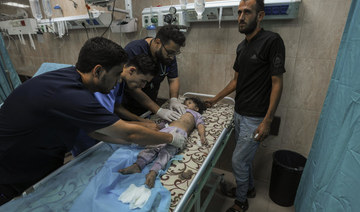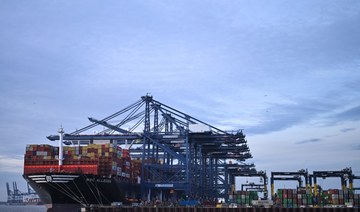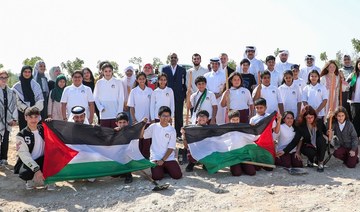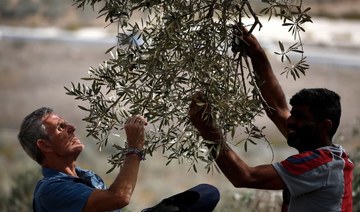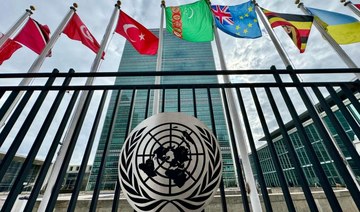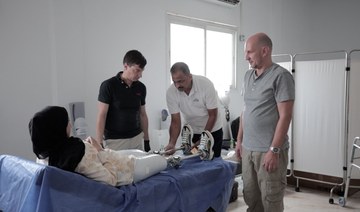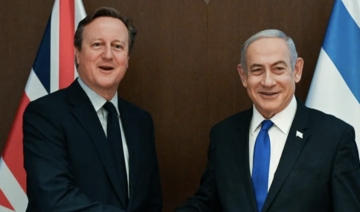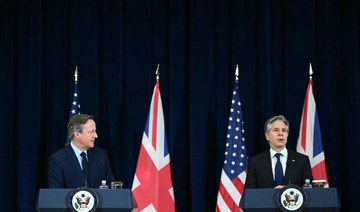JERUSALEM: Tens of thousands of protesters packed the streets of Tel Aviv on Saturday night, marking the 28th straight week of demonstrations against Prime Minister Benjamin Netanyahu’s plan to overhaul the country’s judiciary. Protest leaders promised further “days of disruption” lie ahead.
Netanyahu’s government gave initial approval to a key portion of the overhaul earlier this week, breathing new life into the grassroots movement. The bill still needs to be approved in two more votes, expected by the end of the month, before it becomes law.
Saturday night protests have become a mainstay of the grassroots movement — but this week’s was larger than usual.
In Tel Aviv, protesters unrolled a massive banner reading “SOS.” They threw paint powder into the sky, streaking it pink and orange. “Handmaids” — women dressed in red robes as characters from the dystopian novel and TV series “The Handmaid’s Tale” — once again took to the streets. Their jarring appearance is meant to drive home the notion that, if the overhaul passes, women could be stripped of their rights.
On Tuesday, protesters blocked major highways and disrupted operations at the country’s main international airport after Netanyahu’s parliamentary coalition advanced a bill that is part of the overhaul. Organizers said they would hold another “day of disruption” on Tuesday if he continues to move ahead with the plan.
The Israeli leader was hospitalized on Saturday for dehydration after suffering a dizzy spell and having spent the previous day in the sun without drinking water. He later released a video from the Tel Aviv hospital, saying he felt good. However, Netanyahu was to spend the night in the hospital, according to his office, and a weekly Cabinet meeting scheduled for Sunday was pushed to Monday.
Saturday’s protest in Tel Aviv was joined by others across the country. Protesters brandished lit torches outside Netanyahu’s home in Jerusalem and demonstrated in the coastal cities of Herzliya and Netanya.
After more than six months of protests, the movement shows little sign of abating. Israel’s national labor union and its medical association have joined a long list of groups speaking out against the bill. Military reservists, fighter pilots and business leaders have all urged the government to halt the plan.
Arnon Bar-David, head of the country’s national labor union, the Histadrut, threatened a possible general strike that could paralyze the country’s economy.
“If the situation reaches an extreme, we will intervene and employ our strength,” Bar-David said, calling on Netanyahu to “stop the chaos.”
The Histadrut called a general strike in March as the government pushed the judicial overhaul legislation through parliament after weeks of protest. The move shut down large swaths of Israel’s economy and helped contribute to Netanyahu’s decision to suspend the legislation.
The Israeli Medical Association, which represents 90 percent of Israeli physicians, joined the Histadrut Friday, voting to “employ all available means, including significant organizational measures” to oppose the reasonableness bill.
The law will “devastate the health care system,” the chairman of the association, professor Zion Hagay, said.
The mass protests have taken place since Netanyahu’s far-right government presented the overhaul plan in January, days after taking office. The protests led Netanyahu to suspend the overhaul in March, but he decided to revive the plan last month after compromise talks with the political opposition collapsed.
The overhaul calls for giving Netanyahu’s allies control over the appointment of judges and giving parliament power to overturn court decisions. The Netanyahu government is the most hard-line ultranationalist and ultra-Orthodox in Israel’s 75-year history. His allies proposed the sweeping changes to the judiciary after the country held its fifth elections in under four years, all of them seen as a referendum on Netanyahu’s fitness to serve as prime minister while on trial for corruption.
Critics of the judicial overhaul say it will upset the country’s fragile system of checks and balances and concentrate power in the hands of Netanyahu and his allies. They also say Netanyahu has a conflict of interest because he is on trial for charges of fraud, breach of trust and accepting bribes.
Protests swell in Tel Aviv for 28th week as anti-government movement vows more ‘days of disruption’
https://arab.news/64x7f
Protests swell in Tel Aviv for 28th week as anti-government movement vows more ‘days of disruption’
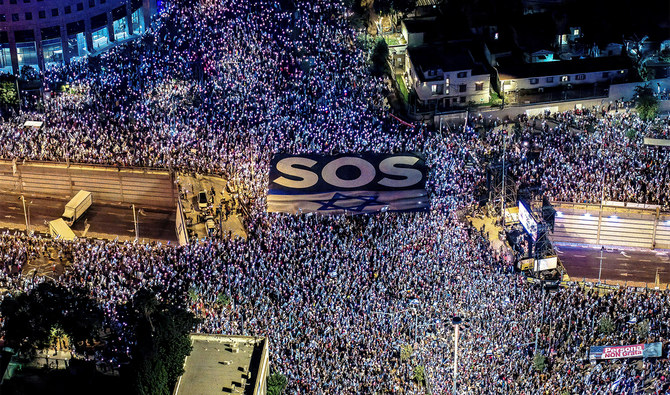
- Netanyahu’s government gave initial approval to a key portion of the overhaul this week
- The bill still needs to be approved in two more votes, expected by the end of this month
Djibouti FM to stand at African Union Commission elections
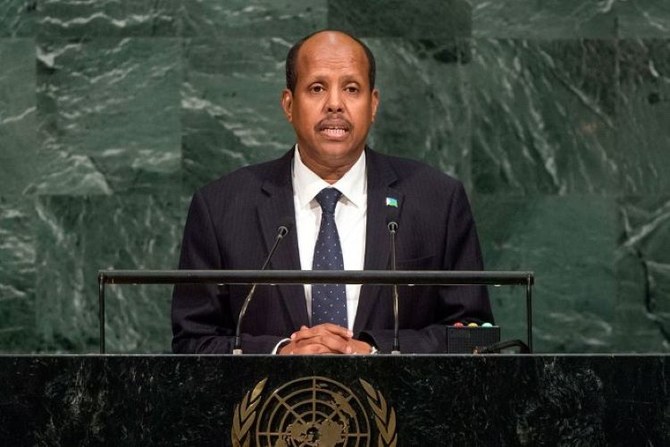
- Mahamoud Ali Youssouf calls for resolution of conflicts in Sudan, Gulf of Aden and Gaza
- Mahamoud Ali Youssouf: The only thing we know for sure today is that the next president will come from an East African country
RIYADH: Mahamoud Ali Youssouf, the minister of foreign affairs and international cooperation of the Republic of Djibouti, intends to stand for election to the African Union Commission.
The commission is based in Addis Ababa, Ethiopia. Its main functions are to represent the AU and defend its interests under the authority and mandate of the assembly and executive council.
The minister said that the main objectives of the commission are to promote integration, economic and social development, peace, security and human rights on the continent. It also aims to strengthen continental and international cooperation.
Tradition dictates that the president of the commission should be elected for a renewable four-year term, and should obviously be African, especially as the next session will be chaired by the East African Community, which includes Djibouti among its members.
The diplomat believes that winning these elections will contribute greatly to strengthening integration between the countries of the continent, as well as to reinforcing African relations with various other geographical groups, given the international and regional acceptance and respect enjoyed by Djibouti thanks to its balanced foreign policy.
Youssouf said he had been encouraged to stand as a candidate in the forthcoming elections by the respect and diplomatic appreciation that Djibouti possesses, highlighting also his long personal experience in the diplomatic field as an ambassador and then as minister of foreign affairs and international cooperation since 2005, and his in-depth knowledge of the work of the AU.
He said that a good knowledge of continental affairs is essential to occupy such an important position, adding that such an organization needs experienced leaders and diplomats to effectively promote continental and international cooperation given the continent’s current circumstances.
“The only thing we know for sure today is that the next president will come from an East African country. It will then be up to the member states to decide on the day of the vote,” he said.
Youssouf said that if elected, he will focus, in the interests of the African people, on three important areas: strengthening cooperation and economic integration between the countries of the continent; developing continental and international cooperation; and cooperation with international and regional organizations such as the UN, the Organization of Islamic Cooperation and the Arab League.
In early January, the Somaliland region signed an agreement with Ethiopia granting it a maritime opening to the Gulf of Aden. This treaty led to a political crisis between Ethiopia and neighboring Somalia, which promptly cancelled the memorandum, calling it illegal.
Youssouf said Djibouti currently chairs the Intergovernmental Authority on Development, and that Somalia and Ethiopia are members, along with other countries in the region, which gives it an additional responsibility in mediating between the two. He said that settlement efforts are continuing with Djibouti and Kenya mediating, with hopes that the two parties will reach an agreement soon.
He added that Djibouti, through its current presidency of IGAD, is very interested in seeing diplomatic relations between Somalia and Ethiopia return to what they were before the signing of the MoU.
Youssouf maintains that other crises in the world have distracted attention from Africa’s bloodiest conflict in Sudan, calling it the most forgotten crisis, especially when it comes to refugees and population displacement. He said that over 6.5 million Sudanese have been forced to leave their homes, with over a third of them displaced outside the country, and that the proliferation of ethnically-based militias in the current conflict is equally alarming.
As Sudan is a founding member of IGAD, he said Djibouti is making intense and continuous efforts in coordination with the other member states and the international community, notably the US and Saudi Arabia, to find a solution to the ongoing conflict in this brotherly country.
He also revealed that his country had already received representatives of the parties responsible for the crisis in Sudan to listen to their points of view and their vision for a solution. It should be noted that all have affirmed their desire to put an end to the war, and hope that these efforts will lead to a permanent and unconditional ceasefire, Youssouf said.
Recently, attacks on ships in the Red Sea have intensified, targeting vessels and disrupting this most important maritime passage. Youssouf said Djibouti is following these developments with great concern, specifying that the Bab Al-Mandeb Strait, overlooked by Djibouti, is considered an international passage of extreme importance from a political and economic point of view.
He confirmed that any breach of security in this area has global repercussions, given its role as a vital artery for international trade, and called for solutions to be found to the various crises in the region, so that everyone can enjoy peace and security.
With regard to the war on Gaza, Youssouf urged the international community to assume its responsibilities and put an end to the Israeli campaign which has cost the lives of over 34,000 people, as well as the resulting displacement and famine threatening the lives of millions of children.
Jordan nominates ancient Mehras olive trees for UNESCO Intangible Cultural Heritage list
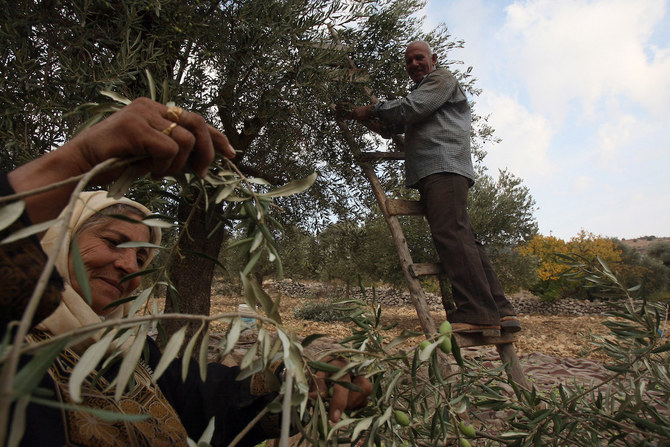
- Culture minister underscored the profound importance of the olive tree in Jordanian society
AMMAN: Jordan has nominated its Mehras olive trees for inclusion on UNESCO’s representative list of Intangible Cultural Heritage for the year 2025, Jordan News Agency reported on Monday.
According to the Food and Agricultural Organization, Jordan has some of the world’s most ancient habitats for olive trees.
Olive trees cover approximately 30 percent of all cultivated land in Jordan, constituting 75 percent of fruit trees. The olive trees hold immense significance for Jordan’s economy, environment, and culture.
Jordanian Culture Minister Haifa Najjar highlighted the importance of the tree to Jordanian heritage, drawing attention to its regional and international significance.
The minister underscored the profound importance of the olive tree in Jordanian society, representing both agricultural prowess and the cultural heritage deeply ingrained in the lives of its people.
She commended the collaborative efforts between the Ministry of Culture and national stakeholders in finalizing the nomination dossier for “The Ancient Olive Tree — Al-Mehras” to be presented to UNESCO in Paris.
Najjar noted the ministry’s commitment to documenting and safeguarding elements of intangible cultural heritage and the positive effect of such nominations on Jordan’s cultural presence globally.
The ministry previously secured UNESCO recognition for Jordanian cultural elements such as As-Samer traditional dance and mansaf, a traditional dish.
The ministry has participated in joint Arab nominations to UNESCO, highlighting the interconnectedness of cultural practices across the region. Previous submissions included files on date palm cultivation and Arabic calligraphy.
Looking ahead, Najjar mentioned joint Arab nominations currently under consideration for the 2025 UNESCO list. These encompass an array of practices and traditions, including mud architecture, traditional attire for men, musical instruments such as the oud, and various crafts and skills associated with Arab cultural heritage.
Dubai launches major AI economic strategy
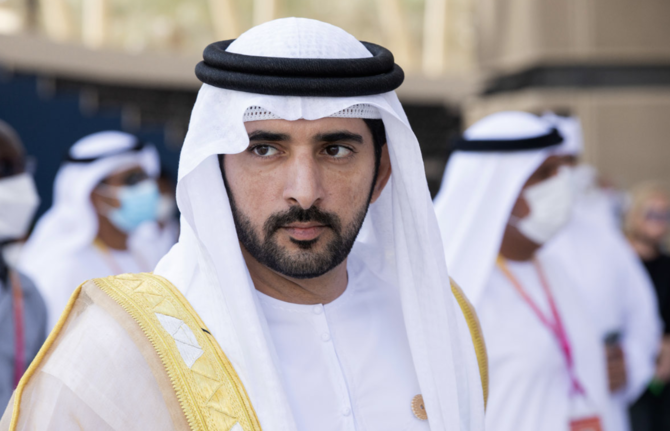
- Crown prince said initial phase of plan, by leveraging AI, would enhance quality of life and well-being for Dubai residents
RIYADH: Dubai’s crown prince on Monday launched a major artificial intelligence drive across government, business and education in the emirate.
The Dubai Universal Blueprint for Artificial Intelligence aims to achieve the Dubai Economic Agenda D33 — to double the size of the economy by 2033 — by adding AED100 billion ($27 billion) from digital transformation and increasing economic productivity by 50 percent.
The strategy includes appointing chief Al officers in government entities, the launch of a Dubai AI and Web3 campus, the launch of AI weeks at the emirate’s schools, a plan to attract data centers and the launch of a trade license for AI.
Sheikh Hamdan bin Mohammed Al-Maktoum said that the initial phase of the plan, by leveraging AI, would enhance quality of life and well-being for Dubai residents.
“Dedicated incubators and campuses for artificial intelligence will be launched to further enhance Dubai’s vibrant AI ecosystem, and finally AI will be celebrated in Dubai schools with the introduction of an AI week,” he said on X.
“We will annually review, update and introduce new projects under this plan, ensuring it keeps pace with all developments. Dubai is a city centered around its people, and to this end, we will dedicate all our resources and energy to make it the happiest place in the world.”
The crown prince said: “In 1999, his highness Sheikh Mohammed bin Rashid Al-Maktoum initiated the pioneering journey of the future by launching Dubai’s digital transformation, a venture that has continued to achieve milestones, leading to the recent unveiling of the Dubai Digital Strategy last year.
“We have realized record-breaking accomplishments that have established us as the premier hub for billion-dollar global enterprises in the technology and artificial intelligence sectors within the region,” he added.
Sheikh Hamdan said that the evolution of AI is presenting opportunities for nations and governments, but posing challenges to those unable to keep pace.
For Dubai, this requires a “swift and adaptive action plan,” responding to the “rapid changes in technology and AI,” he added.
UAE clothing brand ‘The Giving Movement’ donates over $800,000 to Gaza
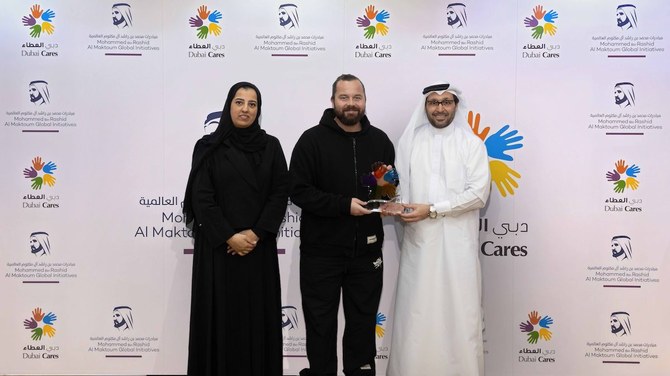
- Donations earmarked for hot meals, food packages, and the provision of emergency shelter
DUBAI: A UAE-based sustainable clothing brand said on Monday that it had contributed more than AED 3 million ($816,798) in emergency relief aid for Gaza since the beginning of Israel’s war on the Palestinian enclave.
All proceeds donated to Dubai Cares charity by The Giving Movement were earmarked for the delivery of crucial support to Palestinians in Gaza, including hot meals, food packages, and the provision of emergency shelter.
The brand raised the money through the “Gaza In Our Hearts” fundraising campaign.
Dubai Cares has forged a partnership with American Near East Refugee Aid, a nongovernmental organisation, collaborating closely with UN agencies, diplomatic channels, and other NGOs to establish aid channels for swift and effective delivery of life-saving supplies.
Dr. Tariq Al-Gurg, CEO of Dubai Cares, commended the clothing brand for its philanthropic efforts.
“The Giving Movement has truly embodied its brand name and set an example for other brands to make a positive impact on the lives of those who urgently need our assistance,” he said.
Dominic Nowell-Barnes, founder of The Giving Movement, said: “Our collaboration with Dubai Cares underscores our commitment to standing with the community and providing assistance to those in need.
Hamas must accept truce deal and be removed from Gaza leadership, UK foreign secretary says
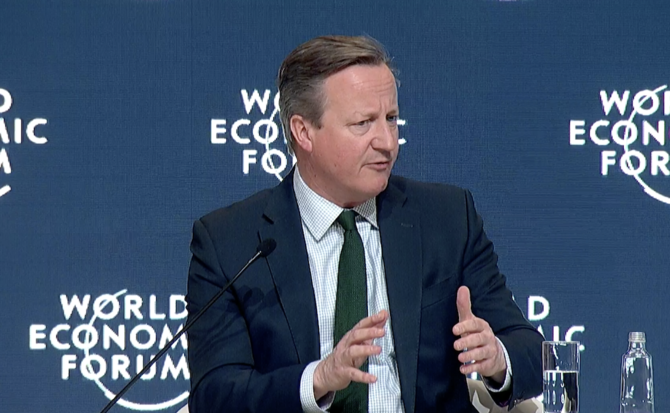
- ‘All the pressure of the world’ should be on militant group, David Cameron tells WEF Special Meeting in Riyadh
RIYADH: Hamas was urged on Monday by British Foreign Secretary David Cameron to accept an offer of a 40-day ceasefire and the release of “potentially thousands” of Palestinian prisoners in return for freeing Israeli hostages.
Speaking at a Special Meeting of the World Economic Forum in Riyadh, the former UK prime minister said the Palestinian militant group had been given “a very generous offer of sustained 40-day ceasefire, the release of potentially thousands of Palestinian prisoners, in return for the release of these hostages.”
A Hamas delegation is due in Egypt on Monday, where it is expected to respond to the latest proposal for a truce in Gaza and a release of hostages after almost seven months of war in the enclave, which broke out after militants killed nearly 1,200 people in southern Israel on Oct. 7.
“I hope Hamas do take this deal and, frankly, all the pressure in the world and all the eyes of the world should be on them today saying take that deal,” Cameron said, adding the proposal would lead to a “stop in the fighting that we all want to see so badly.”
Egypt, Qatar and the US have been trying to mediate an agreement between Israel and Hamas for months, but a flurry of diplomacy in recent days appeared to suggest a new push toward halting hostilities.
The UK foreign minister said that for Palestinian statehood to become a reality, there needed to be a wholesale change in thinking on both the Israeli and Palestinian side.
For a “political horizon for a two-state solution,” with an independent Palestine co-existing with Israel, the “people responsible for Oct. 7, the Hamas leadership, would have to leave Gaza and you’ve got to dismantle the terrorist infrastructure in Gaza,” he said.
“You’ve got to see a political future for the Palestinian people, but you’ve also crucially got to see security for Israel, and those two things have to go together,” he added.
Pakistani Prime Minister Shehbaz Sharif, who joined Cameron on the panel discussing what policymakers needed to do to rejuvenate global growth, went further and told the forum that the world could not focus on economic development unless it had peace.
“I want to make it very clear, the world will not be in peace unless there is a permanent peace in Gaza; I am speaking very frankly,” he said.
Sharif said the breakout of conflict between Russia and Ukraine had already given a warning of what conflict means for growth, adding that it caused commodity prices to skyrocket, inflation to soar, and impacted imports and exports of food and raw materials.
Saudi Arabia’s Minister of Economy and Planning, Faisal Alibrahim, echoed the Pakistani leader’s assertions, adding that current economic growth levels were lower than desired, and that increased productivity and global collaboration were the two keys to improving the situation.
“Productivity needs to see an upward shift,” he said. “We need to focus on the tools, the interventions, that will help us grow productivity.
“Secondly, (do we want) collaboration or fragmentation? A more fragmented world is a lower-growth world and with fragmentation comes a lot of cost. Without collaboration, we cannot achieve higher growth rates for the global economy.”



